| WALTER MONDALE | |
August 15, 2000 |
|
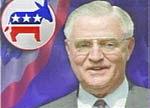
|
Former Vice President and Presidential candidate Walter Mondale discusses the current Vice President's campaign.
|
|
JIM LEHRER: And now, to a Newsmaker interview with former Vice President Walter Mondale, the 1984 presidential candidate of this Democratic Party. Mr. Vice President, welcome. WALTER MONDALE: Thank you. JIM LEHRER: Speaking of the changing political map of the Democratic Party, your first Democratic convention was when? WALTER MONDALE: 1964. JIM LEHRER: And what was that like? WALTER MONDALE: Well, there was a big... It was a glorious one, since we nominated Johnson and Humphrey from Minnesota. But it was the beginning of the racial explosion. The Democratic Party had not really come true to the issue of desegregation in the South. Our parties were segregated. The big fight was over Mississippi. And when I went in as a delegate for Minnesota last night, I sat right behind the Mississippi delegation. They were all seated, blacks and whites, a new Democratic governor who looks great to me. They're all working together. And what a difference from those years ago, because it was an all white delegation then - segregationist; the convention kicked them out by forcing them to sign a loyalty oath which they wouldn't do because they intended to vote for our opposition. JIM LEHRER: Loyalty to the national ticket. WALTER MONDALE: Yes. They wouldn't do that. JIM LEHRER: They wouldn't do it. WALTER MONDALE: And the governor said we paid our debt to the Democratic Party in full and led the fight over to the other... it was really something. And then for about four years, we had to go through this. But now the transition has been made, we're an integrated political party. Boy, it feels good for somebody who has been through it like I have.
WALTER MONDALE: Right. |
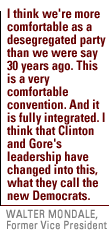 |
||||||||||||||||||
| A changed party | ||||||||||||||||||||
|
JIM LEHRER: Now, did the party that nominate you, is that the still same one that's meeting here today? Has it changed? WALTER MONDALE: Yeah, it's changed. I think 20 years is a long time in the nation's life. I think we've moved on to other issues. We've had experience, which taught us things over those 20 years. I think we're more comfortable as a desegregated party than we were say 30 years ago. This is a very comfortable convention. And it is fully integrated. I think that Clinton and Gore's leadership have changed into this, what they call the new Democrats. I'm satisfied with what... JIM LEHRER: You don't have a problem with the Democrats? WALTER MONDALE: No. JIM LEHRER: You're not a new Democrat are you?
JIM LEHRER: Some people have suggested that he's got some tasks similar to yours in 1984 if he is going to win this election in the year 2000. Do you see it that way? Do you see any similarities? How would you compare the situation? WALTER MONDALE: Well, in one sense, I wasn't running for President as a sitting Vice President, though I had been Vice President under Carter. There has been a four-year interval. Nevertheless people thought of Carter-Mondale. So, in one sense I had the task of being seen as a principal, a President in my own right. That's difficult for a Vice President because even though Gore has probably broken all records at being a partner, being involved almost as a co-equal in this administration, there's something about how the public looks at it. You look number two to them. Now it can be changed. George Bush, the father, did that in '88. I think what Gore's got to concentrate on Thursday night through the rest of this campaign is within himself to feel like the President, talk like the President, lead like the President, but lead as Al Gore. And I think if he'll do that, people will feel it and feel good about it. JIM LEHRER: And not talk very much about what... about the Clinton-Gore administration of the past eight years, just talk about - okay, what I'm going to do now? WALTER MONDALE: People have heard Clinton-Gore for eight years. I think he should talk about the Gore-Lieberman future and where he will take us. I thought the President's speech last night was brilliant because he really built the case for what Clinton and Gore have done together. I think he sold it to the American people. Now Gore should tell us Thursday night, and I think he will, here's where we're going to go. JIM LEHRER: Okay. Speaking of Lieberman, you broke a lot of new ground when you chose Geraldine Ferraro as your running mate in 1984. It has been suggested that Al Gore has done the same because Joe Lieberman is the first Jew ever to run on a national ticket. Similarities from your point of view? WALTER MONDALE: Yes, in principle, in this town, 40 years ago we opened a door when we nominated a Catholic, John Kennedy, for President. It's changed a nation. You never hear that Catholic-Protestant stuff anymore. That was the end of it. I think that Mr. Lieberman, being the first Jew, magnificent public servant, once they are elected, I don't think you'll ever hear about those differences again in America. |
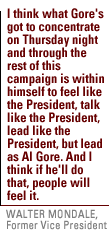 |
|||||||||||||||||||
| A Clinton problem | ||||||||||||||||||||
|
JIM LEHRER: You're talking about what Al Gore has to do now to win. Does he have a Clinton problem? Beyond the Clinton record of, that he recited last night, are there some negatives about Bill Clinton that Al Gore has got to deal with, and, if so, what?
JIM LEHRER: For example? WALTER MONDALE: Well, he's going to cut taxes a trillion dollars, and then by magic, something is going to happen. We've been through that already. We cut taxes hugely. It ran up interest rates, it caused the value of the dollar to soar. We lost our exports. We were once called the bicoastal society. It wiped out agriculture. Now they're talking about doing that again. When I campaigned against Reagan, he was talking about "Star Wars." Don't worry about the Soviets, they'll send those missiles at us but we'll never be hurt. We'll have this high altitude defense. They're back at it again even though not one of those defensive missiles have ever worked. I think we should keep testing it. But to commit us to a system that could lead to an arms race, that's the same thing we talked about 20 years ago. And they now want to privatize Social Security. That's what they were talking about then. So they talk about leadership. It sounds like it's a little stale to me. JIM LEHRER: But what about those... WALTER MONDALE: And I'm non-partisan.
WALTER MONDALE: Well, you look at their platform. They tried to fuzz this all up, but on a whole host of issues there are differences -- on choice, on guns, on the commitment to education, on a whole range of issues. And if they get their way on that trillion-dollar tax cut, there won't be any money around for anything, and we'll be, I think, going through what we went through in the 80s. I think the differences are very deep. JIM LEHRER: An important election for the future of this country in terms of the direction it goes? WALTER MONDALE: I think so. And I think the great challenge for Al Gore, and tomorrow night Joe Lieberman, is to reassure and show the American people that they know where we're going and they make it clear and that they're the people to lead. I think if they do that, we've got an excellent chance of winning. JIM LEHRER: But they have to show they're going to go a different place than the Republicans would take the country? WALTER MONDALE: Oh, I think there is no comparison. These differences are so great that - in the domestic field, the international field, I don't think there is any question about it. JIM LEHRER: Why is Al Gore behind, Mr. Vice President? WALTER MONDALE: I think it's a problem that vice presidents have. I know, I've been through it. And he can correct that Thursday night. I think this is going to be... I'm not glossing over anything. This is going to be a very close election but I think Gore and Lieberman can do it. JIM LEHRER: Why do you think they can do it? WALTER MONDALE: Because I think they've got the talent. You know, Gore is a very gifted person, very disciplined -- really knows this government. Lieberman is one of the most respected members of the Congress and has been for several years. They are young and strong. They know what they're doing. And I think the public will see that. JIM LEHRER: When you came into this hall last night, did it make you feel young again, a young Democrat again? WALTER MONDALE: You know what happened? It was like a road down memory lane there because all these friends of mine, some of whom I haven't seen for 16 years, were coming up and saying hello to me -- remember about this, remember about that. It was a wonderful... I intend to do some more of it tonight. JIM LEHRER: Mr. Vice President, good to see you and thank you for coming by. WALTER MONDALE: Thank you. |
 |
|||||||||||||||||||
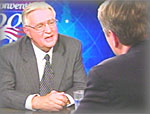
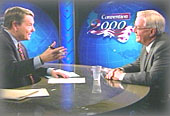 JIM
LEHRER: Well, now, speaking of being through it, 20 years later, of
course in 1984, the Democrats nominated you for President of the United
States.
JIM
LEHRER: Well, now, speaking of being through it, 20 years later, of
course in 1984, the Democrats nominated you for President of the United
States. 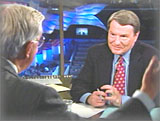 WALTER
MONDALE: I'm a little old to be a new Democrat, but I know this: That
you have to change as the nation changes. You have to respond to what
the American people really think we need to do. And that they've done
and that is I think the key to Gore's challenge Thursday night, to show
that we're going to keep going ahead.
WALTER
MONDALE: I'm a little old to be a new Democrat, but I know this: That
you have to change as the nation changes. You have to respond to what
the American people really think we need to do. And that they've done
and that is I think the key to Gore's challenge Thursday night, to show
that we're going to keep going ahead. 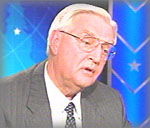 WALTER
MONDALE: Well, obviously the personal behavior of the President at that
time, it's there. Everybody knows about it. But I think everybody knows
that Gore is not responsible for that, and he himself, his family and
so on, have an exemplary history that we all know about. So I don't
think he should spend any time on that. I think he should take credit
for what Clinton and Gore have done. But I think the record is very,
very good. Could I make one... I don't want to interrupt you. One of
the things that strikes me about this campaign thus far is that the
Bush campaign's issues, the fundamental issues are the same ones I campaigned
against 20 years ago.
WALTER
MONDALE: Well, obviously the personal behavior of the President at that
time, it's there. Everybody knows about it. But I think everybody knows
that Gore is not responsible for that, and he himself, his family and
so on, have an exemplary history that we all know about. So I don't
think he should spend any time on that. I think he should take credit
for what Clinton and Gore have done. But I think the record is very,
very good. Could I make one... I don't want to interrupt you. One of
the things that strikes me about this campaign thus far is that the
Bush campaign's issues, the fundamental issues are the same ones I campaigned
against 20 years ago. 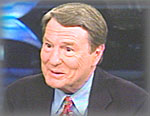 JIM
LEHRER: Absolutely. What do you say to to those folks who say, in light
of what you just said, hey, wait a minute there's really not that much
at stake in this election. They're fighting in the middle. There are
not that many differences. You don't see it that way at all, do you?
JIM
LEHRER: Absolutely. What do you say to to those folks who say, in light
of what you just said, hey, wait a minute there's really not that much
at stake in this election. They're fighting in the middle. There are
not that many differences. You don't see it that way at all, do you?